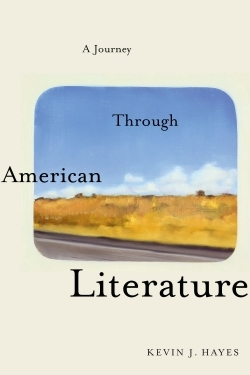
A Journey through American Literature
“Was there any?” was the response of a film historian when Tom Stempel, a professor of cinema, mentioned that he was researching writing in American television. Film and television screenplays usually do not appear on lists of great literature. Autobiograpies and travel accounts similarly get pushed aside by novels, poetry, and short stories. In A Journey Through American Literature, Kevin J. Hayes, a professor of English at the University of Central Oklahoma, showcases fine American writing of many kinds, ranging from seventeenth-century promotional tracts—written to attract Europeans to the New World—to The Namesake, Jhumpa Lahiri’s twenty-first-century novel about Indian immigrants in the United States. “Any piece of writing that approaches excellence can be considered literature regardless of genre,” he explains. More literature is to be found in travel writing by William Bartram, Francis Parkman, and John Stephens, he believes, than “in any number of nineteenth-century novels.”
Hayes discusses the work of dozens of authors, but reserves high praise for a mere handful. “Few could argue,” he says “with the proposition that William Faulkner may be the greatest American novelist of the twentieth century.” Yet Faulkner’s novels are difficult to understand and can put off even serious readers. In an interview in 1956, told that some people could not comprehend his writing, even after they had read it two or three times, Faulkner suggested, “Read it four times.” For readers who are intimidated by Faulkner, Hayes recommends As I Lay Dying, a novel he considers “more approachable” than The Sound and the Fury.
Some of the most creative writing in the United States today, says Hayes, is being done for The Simpsons, a television series. But much television writing now is done “by committee.” Credits for The Simpsons, for example, often list many writers for each episode, making it difficult to track their “individual personality” in the group’s work. Larry David and Jerry Seinfeld, on the other hand, successfully projected their individuality in Seinfeld, a television program which they called “a show about nothing” and Hayes calls “a drama of the everyday” featuring “some of the smartest writing television has seen in recent decades.”
A Journey Through American Literature is a delightful collection of insight, excerpts, and advice. With the book as a guide, readers are likely to approach American writing with better understanding and appreciation, sampling Faulkner with less fear and viewing Seinfeld with more respect.
Reviewed by
Karunesh Tuli
Disclosure: This article is not an endorsement, but a review. The publisher of this book provided free copies of the book to have their book reviewed by a professional reviewer. No fee was paid by the publisher for this review. Foreword Reviews only recommends books that we love. Foreword Magazine, Inc. is disclosing this in accordance with the Federal Trade Commission’s 16 CFR, Part 255.
